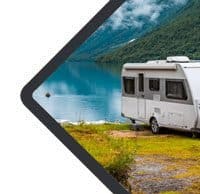Leave the campsite as if you were never there
It seems like not a day goes by without more troubling news about climate change. For RVers, who cherish the outdoors for rest and recreation, who flock to our national parks and find spiritual rebirth in the presence of nature in its pristine state, the climate crisis should be of particular concern.
It’s clear. We all need to do our part. Meaningful change will come in the combination of small individual gestures and big initiatives by government and industry.
Fortunately, there are several strategies that we can adopt – some quite painlessly – to lighten our impact on the environment while camping.
Give yourself a challenge and see how many you can put into practice this season. The planet will thank you.
Choose an Eco-Friendly RV
Smaller, lighter models are generally more fuel-efficient or less of a drain on the tow vehicle.
Consider a Hybrid or Electric RV
As of now, an emerging option in the market, but electric and hybrid RVs have the potential to significantly reduce emissions.
Maintain Your RV
Regular maintenance such as checking tire pressure, changing oil, and ensuring your engine is running efficiently can improve fuel economy.
Reduce Your Energy Consumption
- Installing Solar Panels on your RV can help power your electrical needs through a renewable and limitless energy source.
- Switch to LED Lighting which consumes less power and lasts longer.
- Opt for energy efficient appliances to reduce power consumption.
- Improve your RV’s insulation to keep it warmer and cooler when needed while relying less on heating and air conditioning.
- Plan efficient routes to shorten driving times and distances and visit locations near each other before moving on.
- Slow Down – driving at slightly lower speeds can significantly improve fuel efficiency.
- Enjoy longer stays in one place rather than hopping from site to the next.
Conserve Water
- Take shorter showers, fix leaks, and use water-saving fixtures.
- Gray water recycling – use gray water (from sinks and showers) for flushing the toilet or cleaning.
Practice Sustainable Living
- Use reusable plates, utensils, and cups instead of single-use items.
- Recycle and compost – sort your waste appropriately and consider composting organic waste.
- Buy Local – purchase from local markets and farmers to reduce emissions from long distance shipping and support local economies.
Use Eco-friendly Products
- Use environmentally friendly cleaning agents for bathing, dishwashing, and laundry.
- Opt for eco-friendly toiletries, like biodegradable shampoos, toothpaste, and soaps.
Up Your Energy IQ
- Monitor your power consumption by keeping track of your energy usage and aim to reduce it where possible.
- Use rechargeable batteries and dispose of old ones properly.
- Use natural ventilation and dress appropriately to minimize the use of air conditioning and heaters.
Explore Dry Camping
As the name implies, dry camping is camping without the aid of conventional hook ups to electricity, water and sewage. It’s often confused with boondocking, but, whereas boondocking refers to camping in remote, “wild” locations, dry camping can be practiced in state parks, rest areas, your neighbour’s driveway or even a Walmart parking lot.
Either way, it’s camping “off the grid”, so self-sufficiency is key, which means you need to be prepared with full water tanks, empty gray and black water tanks and your own power source through solar and/or propane.
Educate Yourself and Others
- Learn about the ecosystems you visit and how to protect them.
- Follow Campsite Rules by sticking to designated camping areas and follow rules designed to minimize environmental impact.
- Spread Awareness by sharing what you’ve learned with fellow campers to promote eco-conscious camping.
As we stated earlier, it won’t be one thing that addresses the challenge in a meaningful way, but a whole arsenal of small and big changes made by individuals, companies and governments on multiple fronts that will have an impact.
Change starts with you.
Are you already using some of these sustainable swaps in your RV? Let us know on our social networks.

















